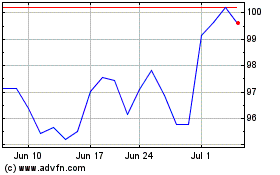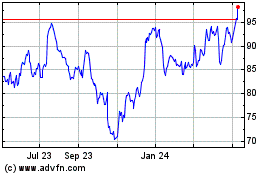By Corrie Driebusch and Maureen Farrell
Palantir Technologies Inc. and Asana Inc. made history by both
completing direct listings on the New York Stock Exchange on the
same day, a milestone for the little-tested way to go public.
But Palantir's debut was mired by technical issues with Morgan
Stanley software that prevented some existing investors in the
company from unloading shares for much of the afternoon, according
to people familiar with the matter, throwing into question whether
there are more sales waiting in the wings.
The data-mining company's stock opened for trading at $10 a
share around 1:40 p.m. New York time. Once it did, current and
former employees of Palantir who wanted to sell some of their stake
on the open market had difficulty doing so, these people said.
Palantir employees use Morgan Stanley's stock-plan business, called
Shareworks, which suffered from technical difficulties Wednesday.
The Shareworks platform is used by many companies, not just those
going public via direct listings.
The problems eased late in the day, and the system was fully
functional by 3:30 p.m. ET, according to a person familiar with the
matter. Some employee sell orders were able to be executed before
the close of trading, some people familiar with the matter
said.
By the time markets closed, Palantir's stock was worth less than
it was earlier in the day. The stock closed at $9.50 -- below its
high of $11.42 and its first-trade price. Still, that netted the
company a valuation of roughly $21 billion, and shares remained
above the $7.31 and $9.17 average prices where they had changed
hands in private trades in August and September, respectively.
"We experienced slowness that may have resulted in delayed
logins into our system. At all times, our call centers were
available to execute trades. We will work through any issue that is
brought to our attention and ensure that no employee will be
disadvantaged," a Shareworks by Morgan Stanley spokeswoman said in
a statement. The implication is that employees who had to sell at a
lower price will be "made whole," according to a person close to
the bank.
Palantir didn't respond to requests for comment.
In Slack channels, former employees complained about problems
getting into Shareworks as the system experienced timeouts and
errors saying the website was down, according to people familiar
with the communications.
Mark Green, a 53-year old retired engineer who worked at
Palantir for eight years, said he struggled to sell his shares
because of technical glitches. "I've been waiting 12 years," he
said.
Palantir Chief Executive and co-founder Alex Karp, in an
interview with CNBC Wednesday, said that he had been skeptical
about the public markets but that it was important to let employees
sell shares. "I believe the people who've built this company over
17 years deserved access to liquidity," he said.
The Palantir hiccup came on what was already shaping up to be a
tricky day for its advisers and the NYSE. The exchange had never
dealt with opening two direct listings on the same day. Given the
relatively untested nature of direct listings and their
complexities, some people close to the Palantir and Asana offerings
had told The Wall Street Journal they weren't thrilled that two
were happening on the same day.
But the listings seemed to go off without a hitch from an
exchange perspective, with both stocks opening smoothly and not
experiencing much volatility throughout the trading day. Critics of
direct listings point to potential volatility as a drawback since
there is no investment bank in place to provide buying support if
shares declined, as is the case in a traditional IPO.
Doing a direct listing skirts investment-banking underwriters,
allowing companies to save millions of dollars in fees. It also
means the companies don't raise money for themselves. Instead,
employees and early investors are typically able to cash out stock
on the first day of trading as shares simply list on the exchange
and advisers match buyers and sellers. Both Asana and Palantir
enlisted Citadel Securities as their designated market maker and
Morgan Stanley as their lead financial adviser for their
debuts.
Working in Palantir's and Asana's favor was that they both
entered a red-hot IPO market, one in which investors have
consistently paid up for growing technology companies. Companies
rushing to go public drove September to be the busiest month for
initial public offerings in the NYSE's history. U.S.-listed IPOs
have raised nearly $100 billion in 2020, making it the biggest year
for fundraising since the tech boom and potentially a
record-setting year if the pace keeps up.
Asana and Palantir became the third and fourth notable firms to
use the direct-listing model. Only two other major companies --
Spotify Technology SA and Slack Technologies Inc. -- had ever
completed direct listings before Wednesday. Both stocks closed
above their reference price, a guidepost that is set by the New
York Stock Exchange where no money changes hands. All the direct
listings that have happened to date have traded above their
reference prices on the first day.
Asana's shares closed at $28.80, which is 37% above their
reference price of $21 and above the average price of $25.11 where
private shares changed hands in August. That gave the company,
which makes workplace tools for productivity and communication, a
valuation of about $5.9 billion. Asana is run by Chief Executive
Dustin Moskovitz, one of the co-founders and the first chief
technology officer of Facebook Inc.
Palantir's debut, meanwhile, comes even as its founders have put
in place one of the most aggressive governance structures ever
seen. The shares of Palantir's three co-founders -- billionaire
investor Peter Thiel, Mr. Karp and President Stephen Cohen -- are
structured so they could become more potent as the men sell down
their stakes, according to securities filings. Through a unique
feature of the voting structure, Mr. Cohen, for example, could
still effectively control the company by owning a tiny fraction of
the shares.
The structure of a direct listing typically allows existing
shareholders and employees to sell most or all of their shares
immediately rather than wait for the mandated lockup of 180 days in
most traditional IPOs. Palantir is taking steps to limit the supply
of stock on the market by only allowing existing holders to sell
20% of their shares until early next year. That scarcity could
serve to bolster the stock price.
Eliot Brown and Rob Copeland contributed to this article.
Write to Corrie Driebusch at corrie.driebusch@wsj.com and
Maureen Farrell at maureen.farrell@wsj.com
(END) Dow Jones Newswires
September 30, 2020 21:12 ET (01:12 GMT)
Copyright (c) 2020 Dow Jones & Company, Inc.
Morgan Stanley (NYSE:MS)
Historical Stock Chart
From Mar 2024 to Apr 2024

Morgan Stanley (NYSE:MS)
Historical Stock Chart
From Apr 2023 to Apr 2024
